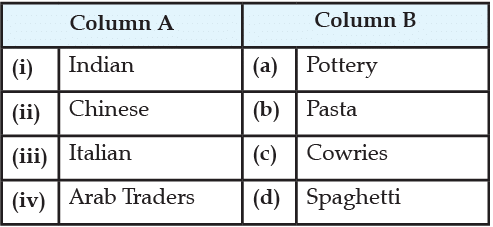Assertion & Reason Test: The Making of a Global World - Grade 10 MCQ
15 Questions MCQ Test History for Grade 10 - Assertion & Reason Test: The Making of a Global World
Match the following items given in Column A with those in Column B:




Match the following items given in Column A with those in Column B:


Arrange the following in the correct sequence:
(i) The Second World War
(ii) The Great Depression
(iii) The Chinese Revolution
(iv) The IMF and the World Bank commenced financial operations
Arrange the following in the correct sequence:
(i) Indentured Labour was abolished.
(ii) Rinderpest (Cattle Plague) had a terrifying impact on the livelihoods of the African people and the local economy.
(iii) The First World War was fought.
(iv) Potato Famine in Ireland
Analyze the information given below, considering one the following correct options:
Consider the jute producers of Bengal. They grew raw jute that was processed in factories for export in the form of gunny bags. But as gunny exports collapsed, the price of raw jute crashed more than 60 per cent. Peasants who borrowed in the hope of better times or to increase output in the hope of higher incomes faced ever lower prices, and fell deeper and deeper into debt. Thus the Bengal jute growers' lament: Grow more jute, brothers, with the hope of greater cash. Costs and debts of jute will make your hopes get dashed. When you have spent all your money and got the crop off the ground, ... traders, sitting at home, will pay only Rs 5 a maund.
Analyze the information given below, considering one the following correct options:
The Silk Routes are a good example of vibrant pre-modern trade and cultural links between distant parts of the world. The name ‘Silk Routes’ points to the importance of West-bound Chinese silk cargoes along this route. Historians have identified several silk routes, over land and by sea, knitting together vast regions of Asia, and linking Asia with Europe and northern Africa. They are known to have existed since before the Christian Era and thrived almost till the fifteenth century. But Chinese pottery also travelled the Same route, as did textiles and spices from India and Southeast Asia. In return, precious metals – gold and silver – flowed from Europe to Asia. raTde and cultural exchange always went hand in hand. Early Christian missionaries almost certainly travelled this route to Asia, as did early Muslim preachers a few centuries later. Much before all this, Buddhism emerged from eastern India and spread in several directions through intersecting points on the silk routes.
In the questions given below, there are two statements marked as Assertion (A) and Reason (R). Read the Statements and choose the correct option:
Assertion (A) : The Silk Routes are a good example of pre-modern trade and cultural links between distant parts of the world.
Reason (R) : The name 'Silk Routes' points to the importance of West-bound Chinese silk cargoes along this route.
In the questions given below, there are two statements marked as Assertion (A) and Reason (R). Read the Statements and choose the correct option:
Assertion (A) : The First World War was a war like no other before.
Reason (R) : The First World War was mainly fought in Europe.
Direction: Mark the Option Which Is Most Suitable:
Assertion : There was a collapse of the system of fixed exchange rates and the introduction of a system of floating exchange rates.
Reason : From the 1960s, the rising costs of its overseas involvements weakened the US’s finances and competitive strength. It could not command confidence as the world’s principal currency.
Direction: Mark the Option Which Is Most Suitable:
Assertion : The railways, steamships, the telegraph were important inventions which transformed the nineteenth-century world.
Reason : Colonisation stimulated new investments and improvements in transport.
Direction: Mark the Option Which Is Most Suitable:
Assertion : Over the nineteenth century, British manufacturers flooded the Indian market.
Reason : The value of Indian exports to Britain was much higher than the value of British imports to India.
Direction: Mark the Option Which Is Most Suitable:
Assertion : When the supply of wheat was disrupted during the First World War, wheat production in Canada, America and Australia expanded dramatically.
Reason : Before the First World War, Asia was a major supplier of wheat in the world market.
Direction: Mark the Option Which Is Most Suitable:
Assertion : During the Great Depression, agricultural regions and communities were worst affected.
Reason : The fall in agricultural prices was greater and more prolonged than that in the prices of industrial goods.
|
19 videos|61 docs|30 tests
|














